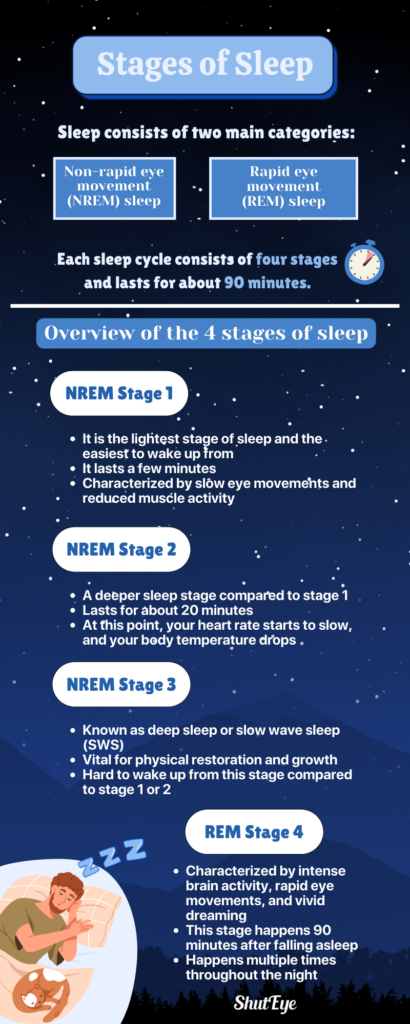


Do you ever wonder why you dream? Or why do you wake up feeling refreshed sometimes but groggy other times? The answer lies in the power of REM sleep.
During REM sleep, your brain is highly active, your eyes rush, and you have vivid dreams. But REM sleep is not just about dreaming; it also helps consolidate memories, process emotions, and promote brain development.
In this article, we’ll explore what REM sleep is and why it truly matters for your mental and physical health.

REM sleep, also known as rapid eye movement sleep (not to be confused with deep sleep), is a stage of sleep that occurs about 90 minutes after falling asleep. It is characterized by quick, jerky eye movements and vivid dreams.
REM sleep makes up around 20-25% of an adult’s sleep cycle and over 50% of an infant’s sleep. It is a common occurrence not only in humans but also in other living mammals and creatures [1].
During REM sleep, our eyes would move rapidly from side to side despite being closed. This is caused by an increased brain wave activity, resembling to one seen in wakefulness [2].
In this period, only the eyes and diaphragmatic muscles remain active and breathing also becomes more erratic and irregular [3]. The increased brain waves during REM sleep is said to be responsible for the vivid and intense dreams we experience.
It’s like our brain simulates different scenarios and emotions, which may help us process and integrate our experiences from the day.
REM sleep, which stands for rapid eye movement sleep, occurs at specific times during our hours of sleep each night. It’s essential for various physiological processes. Here’s what you need to know:

Sleep, a complex and vital process, involves a cycle of distinct stages with unique characteristics and purposes. This cycle includes four primary sleep stages— Non-rapid eye movement (NREM) sleep stage 1, Stage 2, Stage 3, and Rapid Eye Movement (REM) sleep.
Here are brief descriptions of the stages that you go into once you fall asleep:

REM sleep is thought to be essential for our overall health and well-being. Some of the benefits include [4]:

Getting insufficient REM sleep can have adverse effects on your brain and emotional well-being. During REM sleep, your brain consolidates memories and processes emotions. When you don’t get enough REM sleep, it can impact your memory and cognitive abilities.
It can also lead to chronic sleep deprivation, which is associated with health conditions like diabetes, depression, obesity, and heart disease.
Lack of REM sleep can make concentrating and distinguishing between threatening and non-threatening things harder. It can also affect your mood and overall emotional well-being. To prioritize your brain health and well-being, it’s essential to make sure you get enough REM sleep.
Sleep disorders associated with REM sleep can significantly impact your sleep quality and well-being. It’s essential to seek proper diagnosis and treatment if you experience these disorders.
It’s a condition where muscle paralysis is absent during REM sleep, causing individuals to act out their dreams. This can lead to vivid and potentially dangerous movements like kicking, yelling, or flailing arms. RBD may also be a symptom of underlying neurodegenerative conditions such as Parkinson’s disease. Treatment for RBD usually involves medication and changes to the sleep environment for safety.
When you lack sufficient REM sleep, it can negatively affect cognitive function, emotional well-being, and memory consolidation. REM sleep deprivation can disrupt the brain’s ability to generate new cells, resulting in difficulty concentrating and excessive daytime sleepiness.
Addressing sleep disorders associated with REM sleep is crucial for improving your overall sleep quality and health.
If you believe you may be experiencing these disorders, seeking professional help for proper diagnosis and effective treatment is essential.

Sleep deprivation and sleep disorders can have a significant impact on your brain and overall well-being. When you don’t get enough Rapid Eye Movement (REM) sleep, it can affect your ability to concentrate, make you excessively sleepy during the day, and cause memory problems. Sleep disorders can also reduce the amount of REM sleep you get, affecting your thinking, immune system, and memory.
Symptoms of sleep disorders include:
If you think you might be experiencing sleep deprivation or have a sleep disorder, it’s essential to talk to a doctor for help.
If you not getting enough REM sleep at night, don’t worry. There are methods that you can explore to help you improve on it. Below are 5 tips to help you get started:
In conclusion, REM sleep plays a vital role in our overall well-being. It allows us to experience vivid dreams and helps consolidate memories, process emotions, and promote brain development.
Insufficient REM sleep can have numerous consequences, including cognitive impairment and an increased risk of sleep disorders.
To help you get more REM sleep and improve your overall sleep health, try our patented sleep-tracking app, ShutEye®. The ShutEye app tracks and analyzes your sleep cycles, offering personalized insights and recommendations to help you achieve a good night’s sleep.
Institute of Medicine (US) Committee on Sleep Medicine and Research; Colten HR, Altevogt BM, editors. Sleep Disorders and Sleep Deprivation: An Unmet Public Health Problem. Washington (DC): National Academies Press (US); 2006. 2, Sleep Physiology. Available at: https://ncbi.nlm.nih.gov/books/NBK19956/
Insana, S. (2013). REM Sleep. In: Gellman, M.D., Turner, J.R. (eds) Encyclopedia of Behavioral Medicine. Springer, New York, NY. Available at: https://doi.org/10.1007/978-1-4419-1005-9_1681
Miller, K. E., & Gehrman, P. R. (2019). REM Sleep: What Is It Good For? Current Biology, 29(16), R806-R807. Available at: https://doi.org/10.1016/j.cub.2019.06.074
National Institute of Neurological Disorders and Stroke (2024) Brain Basics: Understanding Sleep [online]. Available at: https://www.ninds.nih.gov/health-information/public-education/brain-basics/brain-basics-understanding-sleep
Patel AK, Reddy V, Shumway KR, et al. Physiology, Sleep Stages. [Updated 2024 Jan 26]. In: StatPearls [Internet]. Treasure Island (FL): StatPearls Publishing; 2024 Jan-. Available at: https://www.ncbi.nlm.nih.gov/books/NBK526132/